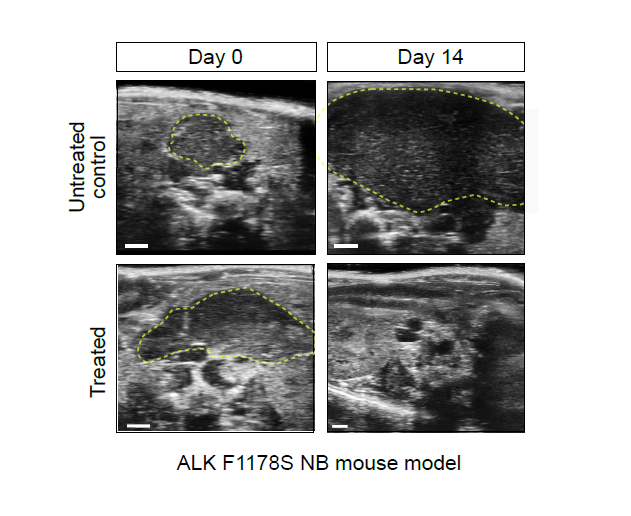New combination of targeted molecules leads to complete tumor regression in high-risk neuroblastoma
Neuroblastoma is the most frequent cancer in infants and accounts for 15% of total childhood cancer mortality. Chemotherapy and surgery are the standard treatments, but have important side effects. Moreover, there is a group of high-risk neuroblastoma tumors, characterized by very specific genetic alterations in the MYCN and the ALK gene, which respond poorly to conventional treatments and therefore have a poor prognosis.
A team of Swedish and Belgian researchers, including the team of Prof. Jimmy Van den Eynden, has now succeeded in developing a promising new treatment strategy for this high-risk form, by combining a drug that blocks overactivity of ALK (Lorlatinib) with a molecule that acts on ATR (BAY 1895344), a protein that plays an important role in the so-called DNA damage repair system. When testing this combination in a neuroblastoma mouse model, the researchers observed complete tumor regression. Moreover, none of the mice relapsed in the course of the experiment.
The research project is part of a multidisciplinary and international collaboration between the teams of Professor Ruth Palmer and Professor Bengt Hallberg from the University of Gothenburg (Sweden) and the bioinformatics team of CRIG group leader Professor Jimmy Van den Eynden.
Prof. Jimmy Van den Eynden: "Our study nicely illustrates the progress that can be made in cancer research through collaboration between different disciplines. Our colleagues in Sweden generate large amounts of molecular data that are sent to us for analysis. Afterwards, they use our bioinformatics data to design new experiments, creating a very interesting interaction. Through this interaction, we tracked down the role of ATR in neuroblastoma."
Drugs that block ALK have already been described to have favorable effects in neuroblastoma. The current study suggests that (high-risk) neuroblastoma patients may benefit further from the addition of ATR blockers. Future clinical studies will have to show whether this combination treatment is also applicable and effective in humans.
Arne Claeys (PhD student in the Prof. Van den Eynden team): "Further analysis of gene expression data from these mouse tumors suggests a possible role for the immune system in the favorable response to treatment. This could not only explain the durability of this response, but also offers fascinating prospects for combination strategies with immunotherapy. Our further research therefore focuses on the underlying tumor-immune interactions.”
Discover the article via this link.
